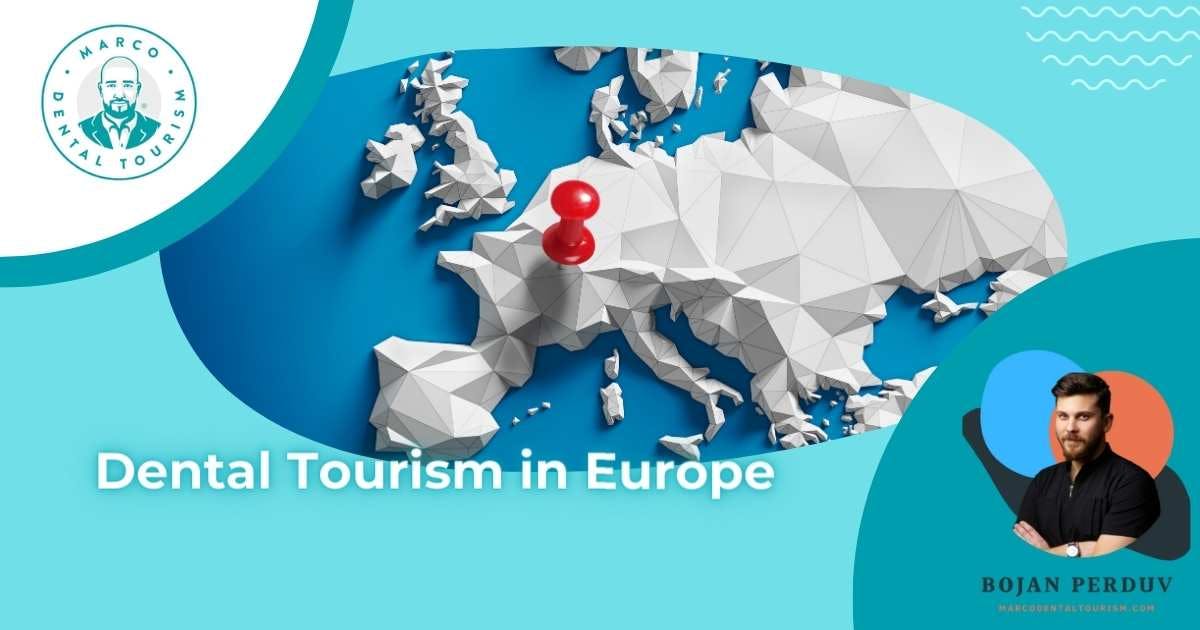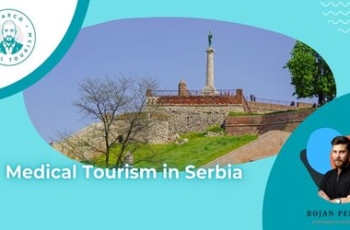Welcome to our concise guide on dental tourism in Europe. In this article, we will explore the top destinations and reasons why Europe is a popular choice for dental tourists. We'll discuss the range of dental procedures available, including implants, cosmetic dentistry, and orthodontics. You'll also find practical information on planning your dental tourism trip, such as travel arrangements and accommodation options. Whether you're looking for affordable dental care, expert professionals, or a chance to combine dental treatments with European exploration, this guide has you covered.
Why Choose Europe for Dental Tourism?
Europe is popular for dental tourism due to high-quality dental care at affordable prices. With its advanced dental clinics, well-trained dentists, and state-of-the-art technology, Europe offers a wide range of dental procedures and treatments. Whether you need a routine check-up, cosmetic dentistry, dental implants, or complex oral surgeries, Europe provides top-notch dental services that meet international standards. In addition to the exceptional dental care, exploring the rich cultural heritage and picturesque landscapes of European countries adds to the appeal of dental tourism in Europe.
What Makes Europe an Attractive Dental Tourism Destination?
The reputation and quality of European dental clinics and dentists make Europe an Attractive Dental Tourism Destination.
Patients can expect world-class facilities, modern equipment, and adherence to strict hygiene standards. Secondly, the cost of dental treatments in Europe is significantly lower compared to many other countries, making it an affordable option for those seeking quality dental care without breaking the bank. Moreover, Europe's accessibility with well-connected transportation systems and the presence of numerous affordable flight options make it convenient for dental tourists from various parts of the world.
What Are the Top European Countries for Dental Tourism?
The most famous countries for dental tourism are:
- Serbia: With its competitive prices and high-quality dental services, Serbia has emerged as a leading destination for dental tourism in Europe.
- Hungary: Known as the dental capital of Europe, Hungary offers a wide range of dental treatments and boasts a well-established reputation for excellence in dental care.
- Spain: Spain combines top-notch dental care with a vibrant tourist experience, making it an attractive choice for dental tourists seeking quality treatments and a pleasant vacation.
- Poland: Poland has gained recognition for its affordable dental care and modern clinics, attracting patients from around the world seeking cost-effective yet reliable dental treatments.
| Country |
Quality of Dental Care |
Affordability |
Language |
Tourism Attractions |
| Serbia |
High |
Very Affordable |
English widely spoken |
Rich cultural heritage, historic sites |
| Hungary |
Excellent |
Reasonably Priced |
English widely spoken |
Stunning architecture, thermal baths |
| Spain |
High |
Varies (depends on location) |
Spanish, English in tourist areas |
Beautiful beaches, vibrant cities |
| Poland |
High |
Affordable |
Polish, English in major cities |
Historical landmarks, scenic landscapes |
.jpg)
What Are The Most Popular Dental Procedures in Europe?
The most popular dental procedures in Europe are dental implants, teeth whitening, veneers, orthodontics, and oral surgeries. Dental implants, in particular, are a sought-after procedure, providing a long-lasting solution for missing teeth. Cosmetic dentistry procedures such as teeth whitening and veneers are also popular for enhancing smiles. Europe's skilled dentists, advanced technology, and commitment to patient satisfaction make it an ideal destination for those seeking high-quality dental procedures.
We will now explore all the necessary information about the available types of dental tourism in Europe that will help you find the right choice of country and service for you.
What Types of Dental Treatments Are Available in Europe?
In Europe, you can find a wide range of dental treatments to address various oral health needs. Here is a list of some common dental treatments available in Europe:
- Dental Implants: Implant-supported tooth replacements that function and look like natural teeth.
- Dental Crowns and Bridges: Restorations used to repair or replace damaged or missing teeth.
- Teeth Whitening: Cosmetic procedure to brighten and lighten the color of teeth.
- Dental Veneers: Thin porcelain shells bonded to the front surface of teeth to improve their appearance.
- Root Canal Treatment: Procedure to remove the infected pulp and save a severely decayed or infected tooth.
- Dentures: Removable appliances used to replace missing teeth and restore oral function.
- Full-Mouth Restorations: Comprehensive treatments that address multiple dental issues and restore the entire mouth.
.jpg)
Are European Dentists Qualified and Experienced?
Yes, European dentists are qualified and experienced. That is because they go through rigorous education and training to ensure their qualifications and expertise. They typically complete a dental degree program, followed by specialized training in various fields of dentistry. Many dentists pursue advanced certifications and attend continuing education courses to stay updated with the latest advancements in the field. European dental professionals adhere to strict standards and guidelines, ensuring the delivery of safe and effective dental care. Patients can have confidence in the qualifications and experience of European dentists, knowing they will receive high-quality treatment during their dental tourism journey.
By reading further, you will better understand why Europe is the right choice for dental tourism with minimal costs.
Understanding Dental Qualifications and Standards in Europe
Europe maintains high standards for dental qualifications and practice. Dentists in European countries are required to obtain a dental degree from recognized institutions and register with the respective dental regulatory bodies. These regulatory bodies ensure that dentists meet the necessary educational and professional requirements to practice dentistry. Additionally, European dental clinics adhere to strict hygiene protocols, follow infection control measures, and utilize advanced technology to provide optimal patient care. By choosing dental tourism in Europe, patients can have peace of mind knowing they will receive treatment from qualified dentists who adhere to rigorous standards of practice.
Planning Your Dental Tourism Trip to Europe
Planning a dental tourism trip to Europe requires careful consideration and research to ensure a smooth and successful experience. Here are some key aspects to keep in mind.
How to Choose the Right Dental Clinic in Europe?
Start by researching clinics and dentists' qualifications, experience, and patient reviews. Look for clinics that specialize in the specific treatment you require and have a track record of successful outcomes. Consider factors such as clinic accreditation, modern facilities, and the use of advanced technology. It's also important to communicate directly with the clinic, discussing your treatment needs, costs, and any other concerns before making a decision. And, of course, it is always good to know what to expect during and after each treatment.
What to Expect During Your Dental Treatment in Europe?
When undergoing dental treatment in Europe, you can expect professional and personalized care. The dental team will conduct a thorough examination and discuss your treatment plan, including the procedures involved, expected outcomes, and duration. European dental clinics prioritize patient comfort and use modern anesthesia techniques to minimize any discomfort during the treatment process. The staff will provide clear instructions for post-treatment care and follow-up appointments to ensure proper healing and maintenance of oral health. In addition, it is very important to know how to overcome various problems such as communication and language barriers.
Language Considerations and Communication in European Dental Clinics
Language considerations can vary depending on the country and dental clinic in Europe. While English is widely spoken in many European countries, it's essential to clarify the language proficiency of the dental team beforehand. Some clinics may provide translation services or have staff members fluent in multiple languages. Effective communication between the patient and the dental team is crucial to ensure a clear understanding of the treatment plan, expectations, and post-treatment care instructions. Clear communication channels and the availability of language support contribute to a positive dental tourism experience in Europe which the numerous advantages of this continent speak of.
Benefits and Considerations of Dental Tourism in Europe
Dental tourism in Europe offers several advantages for patients seeking quality dental care at affordable prices. Here are some key benefits and considerations to keep in mind:
What are the Advantages of Dental Tourism in Europe?
One of the primary advantages of dental tourism in Europe is cost savings. Many European countries offer dental treatments at significantly lower prices compared to other regions, making it an attractive option for those seeking affordable care. Additionally, European dental clinics often uphold high standards of quality and adhere to stringent regulations, ensuring patients receive reliable and professional treatment. Dental tourism in Europe also provides an opportunity to combine dental care with exploring the rich cultural heritage and natural beauty of the continent, making it a fulfilling and memorable experience.
Are There Any Risks or Challenges with Dental Tourism in Europe?
Language barriers may pose a challenge for some patients, especially if the dental team has limited proficiency in English or other languages. It's crucial to ensure clear communication and understanding of the treatment plan. Travel logistics, such as transportation and accommodation, should be planned to ensure a smooth trip. Additionally, it's essential to conduct thorough research and choose reputable dental clinics with experienced dentists to mitigate any potential risks associated with dental tourism.
Insurance and Legal Aspects of Dental Tourism in Europe
Before embarking on dental tourism in Europe, it's important to understand the insurance and legal aspects. Check with your insurance provider to determine if dental treatments abroad are covered or if additional coverage is required. Familiarize yourself with the legal framework and regulations regarding dental procedures in the country you plan to visit. Ensure you have all the necessary documentation, including passports, visas (if applicable), and any medical records or prescriptions. Being informed about insurance coverage and legal requirements will help you make informed decisions and have a hassle-free dental tourism experience in Europe in which some of the useful tips will help you.
Tips for a Successful Dental Tourism Experience in Europe
To ensure a successful dental tourism experience in Europe, consider the following tips:
How to Save Money on Dental Treatments in Europe?
Research different countries and compare prices for the specific treatment you need. Look for special offers, package deals, or discounts provided by dental clinics. Keep in mind that lower prices shouldn't compromise the quality of care, so prioritize reputable clinics with positive reviews and experienced dentists. Consider traveling during off-peak seasons when accommodation and transportation costs may be more affordable. Finally, consult with your local dentist and inquire about any pre-treatment or post-treatment care that can be done at home to reduce the overall costs.
What Are Some Travel Tips for Dental Tourists in Europe?
Familiarize yourself with the basic etiquette of the country you're visiting, including greetings, dining customs, and appropriate dress codes. Respect local traditions and be mindful of cultural sensitivities. It's also helpful to learn a few common phrases in the local language to facilitate communication and show appreciation for the local culture. Additionally, research and plan your itinerary to make the most of your time in Europe and explore the attractions and landmarks unique to each destination. The best way to achieve this is to make an informed decision about accommodation and costs.
Accommodation and Transportation Options for Dental Tourists in Europe
Finding suitable accommodation and transportation options is crucial for a comfortable dental tourism experience in Europe. Consider staying near the dental clinic or in a convenient location with easy access to public transportation. Look for accommodation options that cater to the needs of dental tourists, such as hotels or guesthouses that offer discounted rates or dental tourism packages. Research reliable transportation services or consider renting a car for more flexibility during your stay. It's also worth exploring local travel apps or public transportation systems to navigate the city efficiently. Prioritize comfort, convenience, and proximity to ensure a smooth and enjoyable trip. Here are some very positive and motivational experiences.
Testimonials and Success Stories of Dental Tourists in Europe
Real-life experiences and success stories of dental tourists in Europe can provide valuable insights and inspire confidence in choosing dental tourism as an option.
Real-Life Experiences of Dental Tourists in Europe
Many dental tourists have shared their positive experiences of receiving dental treatment in Europe. They highlight the professionalism and expertise of European dentists, the state-of-the-art facilities, and the high quality of care they received. Patients often express satisfaction with the cost savings compared to their home countries without compromising on the quality of treatment. They appreciate the personalized approach, clear communication, and the ability to combine dental care with exploring the rich cultural heritage of European countries. These real-life experiences demonstrate the success and positive outcomes that dental tourists have enjoyed in Europe.
Success Stories of Dental Treatments in Europe
Numerous success stories of dental treatments in Europe showcase the transformative results that patients have achieved. From smile makeovers and dental implants to complex restorative procedures, patients have achieved improved oral health and regained their confidence in their smiles. The success stories highlight comprehensive treatment plans, meticulous attention to detail, and the use of advanced technologies and materials. Patients often express their gratitude for the exceptional outcomes and the positive impact on their quality of life. These success stories serve as testimonials of the effectiveness and reliability of dental treatments available in Europe.
Conclusion
In conclusion, hearing real-life experiences and success stories from dental tourists who have chosen Europe as their destination for dental care can provide reassurance and confidence in the decision to pursue dental tourism. These testimonials and success stories reflect the high standards, affordability, and positive outcomes that can be expected from dental treatments in Europe.

.jpg)
.jpg)




Share your opinion!
What do you think about this topic?
Comments (0)